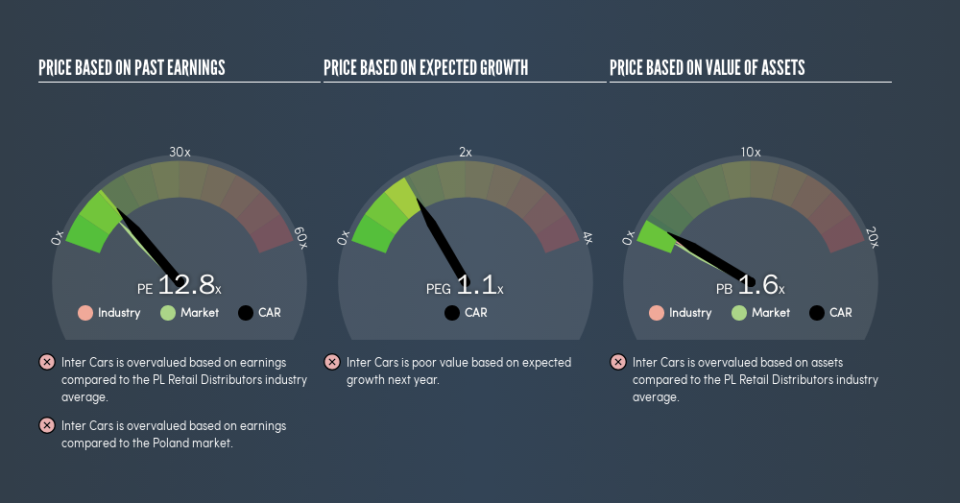Don't Sell Inter Cars S.A. (WSE:CAR) Before You Read This

Want to participate in a short research study? Help shape the future of investing tools and you could win a $250 gift card!
This article is for investors who would like to improve their understanding of price to earnings ratios (P/E ratios). We'll show how you can use Inter Cars S.A.'s (WSE:CAR) P/E ratio to inform your assessment of the investment opportunity. Looking at earnings over the last twelve months, Inter Cars has a P/E ratio of 12.77. That is equivalent to an earnings yield of about 7.8%.
Check out our latest analysis for Inter Cars
How Do I Calculate A Price To Earnings Ratio?
The formula for P/E is:
Price to Earnings Ratio = Price per Share ÷ Earnings per Share (EPS)
Or for Inter Cars:
P/E of 12.77 = PLN201 ÷ PLN15.75 (Based on the trailing twelve months to December 2018.)
Is A High P/E Ratio Good?
A higher P/E ratio implies that investors pay a higher price for the earning power of the business. That isn't necessarily good or bad, but a high P/E implies relatively high expectations of what a company can achieve in the future.
How Growth Rates Impact P/E Ratios
Earnings growth rates have a big influence on P/E ratios. That's because companies that grow earnings per share quickly will rapidly increase the 'E' in the equation. And in that case, the P/E ratio itself will drop rather quickly. Then, a lower P/E should attract more buyers, pushing the share price up.
Inter Cars's earnings per share grew by -3.1% in the last twelve months. And it has bolstered its earnings per share by 8.6% per year over the last five years.
Does Inter Cars Have A Relatively High Or Low P/E For Its Industry?
One good way to get a quick read on what market participants expect of a company is to look at its P/E ratio. As you can see below Inter Cars has a P/E ratio that is fairly close for the average for the retail distributors industry, which is 12.8.
Inter Cars's P/E tells us that market participants think its prospects are roughly in line with its industry. So if Inter Cars actually outperforms its peers going forward, that should be a positive for the share price. Checking factors such as the tenure of the board and management could help you form your own view on if that will happen.
Remember: P/E Ratios Don't Consider The Balance Sheet
The 'Price' in P/E reflects the market capitalization of the company. Thus, the metric does not reflect cash or debt held by the company. In theory, a company can lower its future P/E ratio by using cash or debt to invest in growth.
Such expenditure might be good or bad, in the long term, but the point here is that the balance sheet is not reflected by this ratio.
Inter Cars's Balance Sheet
Inter Cars's net debt equates to 42% of its market capitalization. You'd want to be aware of this fact, but it doesn't bother us.
The Bottom Line On Inter Cars's P/E Ratio
Inter Cars has a P/E of 12.8. That's higher than the average in the PL market, which is 10.5. Given the debt is only modest, and earnings are already moving in the right direction, it's not surprising that the market expects continued improvement.
Investors have an opportunity when market expectations about a stock are wrong. If the reality for a company is better than it expects, you can make money by buying and holding for the long term. So this free visual report on analyst forecasts could hold the key to an excellent investment decision.
Of course, you might find a fantastic investment by looking at a few good candidates. So take a peek at this free list of companies with modest (or no) debt, trading on a P/E below 20.
We aim to bring you long-term focused research analysis driven by fundamental data. Note that our analysis may not factor in the latest price-sensitive company announcements or qualitative material.
If you spot an error that warrants correction, please contact the editor at editorial-team@simplywallst.com. This article by Simply Wall St is general in nature. It does not constitute a recommendation to buy or sell any stock, and does not take account of your objectives, or your financial situation. Simply Wall St has no position in the stocks mentioned. Thank you for reading.

